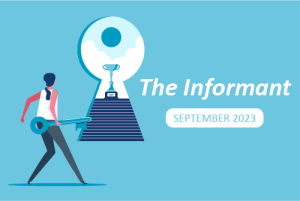Mental health in the workplace: prevention beats cure
April 28, 2016The Informant: Issue 1
It is clear from all the available evidence that the prevalence and cost of mental health issues in Australian workplaces is increasing. Due to limited government resources and an ageing population, employers are likely to find themselves bearing the bulk of the cost of mental illness, especially when the causes can be linked to the workplace environment. This has the potential to become very costly for employers.
The key question for employers is how to respond to a problem that is becoming even more prevalent. Should you simply focus on the issue from a legal perspective and ensure you are well prepared to defend any claims?
A recent study indicates that every dollar spent on a mental health program returns $2.30. In many industries, the return is significantly higher.[1] Does this mean that it makes commercial – and not just cultural and legal – sense for businesses to look at the issue of mental health in the workplace from a broader perspective? As an employer, should you adopt a more holistic approach to reduce the chances of your workers developing mental health problems in the first place?
The size of the problem
At FCB Group, our team often works on matters that involve situations where an employee hasn’t had their mental health cared for in a workplace setting. Eventually, this typically leads them to bring a workers’ compensation claim against their employer.
The available statistics paint a bleak picture, demonstrating that mental health issues are having an adverse impact on workplaces all over Australia. According to the Safe Work Australia Work-Related Mental Disorders Profile 2015, the average time a worker takes off for a mental stress claim is 11.8 weeks. Interestingly, the median time off work for all claims is just 5.3 weeks.
In addition, work pressure accounts for around one-third of all psychological injury claims. Bullying and harassment make up around another 24% of claims. Alarmingly, according to the Australian Workplace Barometer Report on Psychological Safety Climate and Worker health in Australia (AWB Report), 6.8% of the Australian workforce experiences bullying in the workplace. This compares with the world average of 1–4%.
Alarmingly, 70%[2] of employees with a mental health issue caused by work don’t bring a workers’ compensation claim. Instead, they keep working. It is almost impossible to quantify the economic cost of employing a worker whose ‘lights are on but is not at home’. However, various sources estimate that presenteeism costs employers in Australia between $6 and $16 billion each year.
Claims and remedies available to employees
Aside from workers’ compensation, there are a myriad of legal avenues that an employee can pursue if an employer fails to take sufficient care of their mental health, or if workplace conditions cause or contribute to a mental illness. These include, but are not limited to:
- An unfair dismissal or general protections claim under the Fair Work Act 2009 (Cth) (Act);
- An anti-Bullying order;
- A discrimination complaint under either Federal and State laws;
- A negligence claim; and
- Prosecution under criminal legislation.
Employers also need to be aware that damages in mental health cases are often substantial. In some cases, employers are facing payouts in excess of $1 million.
This month a nurse who sought damages after suffering from post-traumatic stress disorder (PTSD) after being seriously injured in a plane crash while transporting a patient was awarded approximately $4.4 million by the NSW Supreme Court[3]. This indicates a recent trend towards towards large sums being awarded in damages previously demonstrated in Nationwide News Pty Limited v Naidu.[4] Mr Naidu was subjected to bullying by his manager. His employer prohibited bullying and was aware of the situation Mr Naidu was facing. However, it did nothing to remedy the problem. After examining the facts in detail, the court held that Nationwide News failed to take the necessary steps to ensure that the appropriate standard of care for Mr Naidu’s psychological health was maintained. Consequently, he was awarded $1.9 million. On 17 December 2015, the Supreme Court of Victoria awarded Kate Matthews, a female construction worker $1,360,000 in compensation for bullying and sexual harassment that caused her serious psychiatric illness[5].
Employer Obligations – what does it mean in practice?
From a strictly legal perspective, the primary reason for advocating a proactive and systemic approach to mental health in the workplace is because health and safety laws in Australia require both businesses and their officers to do so. This duty is a strict liability, meaning it is not negotiable. An accident or injury doesn’t need to occur for a business to be liable; rather, a risk need only exist.
If a business and its officers haven’t taken all reasonable steps to identify and minimise health risks, they will fail in their duties to their employees. Under the various work health and safety legislative regimes in Australia, your business can be fined up to $3 million for a breach of duty of care, and any officers can be fined $600,000 or face imprisonment for up to five years.
It is important to note that health risks are not confined to physical health risks. The rules apply equally to psychological health risks.
So how do you manage your duty of care?
As an employer or manager, to meet your duty of care, you need to assess psychosocial risks such as work stressors, leadership styles, work systems and work characteristics. You also need to ensure there are resources and/or processes for managing those risks and ensure that you are providing training and adequately addressing employee concerns using established and implemented policies and procedures.
Want to learn more?
FCB Group are experts at assisting your organisation in managing mental health issues whether this be proactively, or reactively.
We are committed to promoting mental health awareness and are at the forefront of organising events and discussion groups to educate, promote and encourage an increased focus on mental health, its consequences and most importantly its effective and proactive management in your workplace.
If you would like to learn more about the events run by the FCB Group, or how to manage mental health in your workplace, please contact one of FCB’s Partners in Sydney on 02 9922 5188, Melbourne on 03 9098 9400 or Brisbane on 07 3046 2100.
[1] beyondblue, National Mental Health Commission and Mentally Healthy Workplace Alliance, Creating a Mentally Healthy Workplace: Return on Investment Analysis, Final Report, March 2014, PricewaterhouseCoopers, 2014.
[2] Australian Bureau of Statistics (ABS), Work-Related Injuries, July 2013 – June 2014, cat. No. 6324.0, ABS, Canberra.
[3]Casey by her manager the National Australia Trustees Limited v Pel-Air Aviation Pty Ltd (No 2) [2016] NSWSC 446 (19 April 2016)
[4] (2007) 71 NSWLR 471
[5] Mathews v Winslow Constructors (Vic) Pty Ltd [2015] VSC 728

























